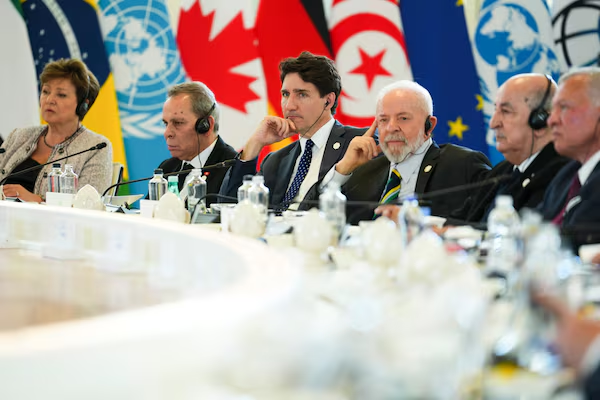Top finance officials from the world’s most advanced economies have gathered in Banff, Alberta, for a high-stakes meeting of the G7 nations.
As the discussions begin this Tuesday and run through Thursday, two central themes are dominating the agenda: the war in Ukraine and the growing economic fallout from U.S. President Donald Trump’s aggressive trade policies.
The meeting—bringing together finance ministers and central bank governors from Canada, the United States, the United Kingdom, France, Germany, Italy, and Japan—comes at a time when the G7’s once-unified stance on global issues appears to be under strain.

The return of Donald Trump to the U.S. presidency has introduced a new layer of uncertainty to an already fragile international landscape.
Ukraine remains a key focus, particularly following recent comments from Trump, who claimed that peace talks between Russia and Ukraine would begin soon after his conversation with Russian President Vladimir Putin.
READ ALSO: Australia Cuts Interest Rates to Lowest in Two Years Amid Global Economic Uncertainty
Ukrainian Finance Minister Sergii Marchenko is attending the G7 meeting and is expected to address the media on Tuesday. His presence underscores Ukraine’s strategic importance in the talks, especially as the group attempts to align on a shared approach to the conflict, which has dragged on since Russia’s invasion in 2022.

Tensions within the G7 have grown in recent months, as Trump’s administration has renewed tariffs on both allies and rivals, while taking a more transactional approach to diplomacy. A U.S. source close to the discussions indicated that Washington is not interested in issuing a joint communique unless it reflects the administration’s specific priorities. “We’re not going to do a communique just for the sake of it,” the source said.
Canadian Prime Minister Mark Carney, who earlier invited Ukrainian President Volodymyr Zelensky to the upcoming G7 summit in June, has played a central role in pushing the Ukraine issue forward.

Meanwhile, U.S. Treasury Secretary Scott Bessent is expected to steer conversations toward what he describes as the G7’s “core priorities,” including tackling global trade imbalances and confronting non-market practices, particularly in relation to China’s industrial overcapacity.
READ ALSO: Trump Claims Putin Wants to End War in Ukraine (VIDEO)
A senior U.S. official added that the group considers it unacceptable for nations to allow Chinese overproduction to flood global markets, undermining domestic industries in G7 countries. That issue, among others, is expected to be a key part of the dialogue as leaders seek consensus in a deeply polarized global environment.

While the G7 is traditionally a platform for collaboration on global economic policy, climate change, and security, analysts caution that this year’s meeting may prove more unpredictable. Internal divisions, fueled by diverging national interests and shifting geopolitical alliances, could hinder progress on critical issues.
With the global economy facing increasing headwinds—from trade tensions and inflation to ongoing conflicts—the outcome of this G7 summit may set the tone for how the world’s leading democracies navigate an era defined by volatility and complex challenges.
Discover more from Scoop Hub
Subscribe to get the latest posts sent to your email.

